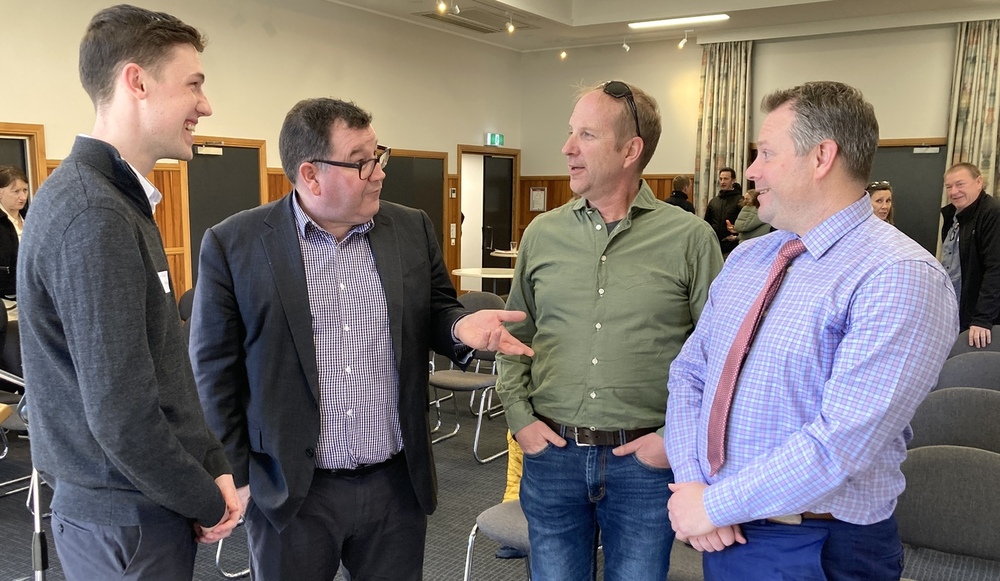‘No easy answers’ from finance minister
Sue Wards
27 August 2023, 5:06 PM
 Hon Grant Robertson speaking in Wānaka on Friday (August 25).
Hon Grant Robertson speaking in Wānaka on Friday (August 25).There were “no easy answers” to many of the questions put to finance minister Grant Robertson at a small meeting in Wānaka on Friday (August 25).
The Wānaka Business Chamber hosted the lunchtime ‘business briefing’, which was also attended by Waitaki Labour candidate Ethan Reille and Queenstown Lakes District Council mayor Glyn Lewers.
Grant, who has been the Minister of Finance for seven years, presented as a somewhat weary politician aware of the complexity of issues, who could offer an assessment of challenges and a range of interconnected variables affecting them - but no easy solutions.
He spoke briefly, painting a picture of a less than positive global economy, the implications of war in Europe, and a range of challenges - some of which remain from the Covid-19 pandemic.
“I'm doing a good job of depressing you about what the world looks like, but it is an enormously challenging environment,” he said.
However he rated New Zealand’s economy as “resilient but heavily impacted”.

Waitaki Labour candidate Ethan Reille, finance minister Grant Robertson, Andrew Howard, and QLDC mayor Glyn Lewers at the event.
The country is under pressure and there is “no point in sugar coating it”, he said.
But he also pointed to our low rate of unemployment, “quite low” public debt compared to some countries [net debt is 18 percent and expected to rise to 22 percent in 2024 - Ed], and a recent Moody's analysis saying New Zealand’s “settings are okay”.
Grant said he stood by the government’s overall direction during the pandemic of “keeping people in work, and keeping people healthy”, acknowledging it “came with a price tag”.
“Now, we have to recognise that in order to make our finances sustainable, the level of government spending has to start reducing.”
Within this region, Grant said while tourism is recovering more quickly from the pandemic than many anticipated, that means pressure on infrastructure. Investment in infrastructure will be “critical”, he said, adding that the approach for some issues such as housing lies in partnerships between central government, iwi, and the private sector.
His vision for New Zealand is “a high wage, low emission economy that gives people financial security”. He said his commitment was to balance being fiscally careful with a focus on wellbeing; “providing those services and giving people hope about the kind of lives that they can live”.
Questions from the floor included whether Grant had any regrets that the Covid stimulus package was not greener (yes, he had); how US investment giant Black Rock would “get its return” from New Zealanders (Grant clarified the government was a broker, not a funder; the country would end up with new infrastructure while BlackRock would gain some returns); and whether GST from tourism could be returned to the regions that generated it (short answer: no).
One person asked what the government’s role is in helping families and businesses deal with inflation and high interest rates, and Grant said he would continue to focus on fiscal policy levers and leave monetary policy to the Reserve Bank. On productivity, he said the country is being held back by infrastructure, skills, and workforce, and we had work to do on research development and innovation, as well as pursuing free trade deals in new areas.
A single parent wanted to know how different life would look for them if Labour was returned to power. Grant responded with increased support for single parents not in work, increased investment in education (including the extension of free early childhood education), and improving access to finance for small businesses.
“I feel like everyone's had a really tough time in the last three years and different people in our society have been impacted to a greater or lesser degree,” Grant said.
“I honestly can't click my fingers and make that better overnight but I think the sustained investments we’re making, the balanced approach that I talked about before is the answer for people in that position.”
Access to health care (including dental health) was raised, which Grant acknowledged was “one of the big challenges for communities like this one”.
He said while Dunedin is getting a new tertiary hospital, the focus would then be providing the “second tier” of health provision in places like Cromwell to service communities like Wānaka. He also acknowledged the raft of challenges around primary care (GPs), adding there was “no short term easy answer”.
Another person asked Grant what the government had achieved in the past six years.
Grant cited the government’s Covid-19 response, with subsequent low death rate, businesses remaining “largely intact”, and people remaining in work. He said the government had “lifted 77,000 kids out of poverty”, revived the apprenticeship system; and built 13,000 state houses.
“I’m pretty proud of our record,” he said.
The general election will take place on October 14.
PHOTOS: Wānaka App





